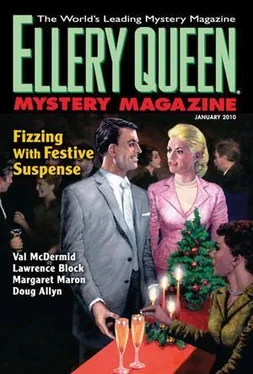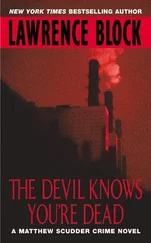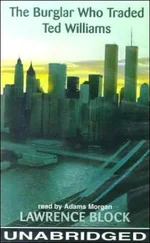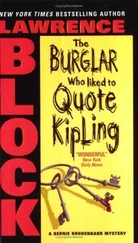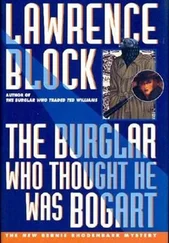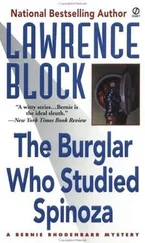Lawrence Block
Who Knows Where It Goes
When the waitress brought him his coffee, Colliard managed a nod and a smile. He added milk but no sugar, stirred, looked out the window at the entrance to the four-story commercial building across the street. He didn’t really want the coffee, he’d had enough coffee today, and this cup wouldn’t make him any more alert than he already was. Its only discernible effect would come hours from now, when he’d want to sleep and it wouldn’t let him.
Of course that might be difficult anyway.
Maybe he should have ordered decaf. He never did, he never even thought of it until he already had a cup of regular coffee in front of him. He’d never been able to see the point of decaf. Why drink the stuff at all if not for the caffeine? It never tasted as good as you hoped it would. Sometimes, if it was particularly good coffee, the smell was wonderful. But then you took a sip, and all you got was disappointment. And caffeine.
He picked up the spoon, stirred the coffee some more, put the spoon down. And left the cup in its saucer. It wasn’t as though he had to drink it. He’d had to order it, so that he could have this table by the window, but now that she’d brought it to him he could sit here until closing time. It wasn’t as though they needed the table for another customer. The diner was mostly empty, and would likely remain that way, like every place else in town. Like every other town in the country.
Hard times. Sometimes it was tough not to take it personally, to see the entire break in the economy as having been aimed specifically at him. When he got that way he forced himself to take a good look around. And it was pretty easy to see that it wasn’t just him. Everywhere he looked, businesses were failing and men and women were out of work. Corporations, absolute household names that had been around as long as he could remember, were going out of business. Banks were imploding. Retailers, from the big box chains to the hardware store on the corner, were turning off the lights and locking the doors. As an economy move, someone had quipped, the light at the end of the tunnel had been turned off.
A matter of months ago Colliard had been sitting on top of the world, and the perch was all the sweeter for the time and effort it had taken him to get there. He’d sweated it out to get the union card — an MBA from a top university. He’d lived off his savings and hit the books hard, and the degree got him his first corporate job. He worked hard, and when the headhunters came calling, he was ready to move up. He earned the promotions, he got the cash and prizes, and he bought the right house and married the right woman. He earned big bucks and lived within his income, and when the chance came along to start his own company, he jumped at it.
And made it work. And figured he had it made.
“Warm that up for you?”
It was the waitress, coffee pot in hand. He smiled, shook his head. “I’ve had too much coffee already,” he said. “But thanks.”
“Something to eat?”
He shook his head.
“That’s okay,” she said. “You sit there as long as you like. That way people look in the window, they see we’re still open. You know Sacco’s? On the next block?”
He didn’t know the neighborhood at all, but the question didn’t seem to require an answer.
“Thirty years they been there,” she said. “Good times and bad. Friend of mine’s worked there twelve years herself, and Friday afternoon the owner called them all together and told them it was the last day. Just like that. Twelve years, thirty years just like that. How can a business just disappear, here one day and gone the next?”
He said, “‘Who knows where it goes when it’s gone.’” She looked at him, and he told her it was a line from a song. She said she’d like to hear the rest of the song, and he said that was the only line he remembered.
“Well, it’s a good one,” she said, “‘Who knows where it goes when it’s gone.’ Not me, that’s for sure.”
“I’d see your name in the papers,” Sully had said earlier. “Morton H. Colliard. What’s the H stand for?”
They’d met two days before in a diner not too different from the one he was in now, but a hundred miles away. They sat with cups of coffee in a rear booth. They knew Sully there, knew to bring him his coffee and then leave him alone.
“Henry.”
“Never knew about the H, never mind the four letters after it. Just Mort Colliard, and I couldn’t have said if it was Morton or Mortimer. Or just Mort. Means death in French, doesn’t it?”
“I don’t speak French.”
“Didn’t you have to learn it in school? Got my own hands full with English. Morton Henry Colliard. Gave me a turn the first time I saw it, and I can’t say I ever got entirely used to it. Of course it was a good thing, a sign you were getting places, and I was happy for you.”
Was he? Sully had cool grey eyes, hard to read. Colliard had learned to take what Sully said at face value, because trying to get any deeper was a waste of time.
“But all the years I knew you,” Sully said, “the whole point was keeping your name out of the papers. So it was hard to get used to, that you were in the papers, and glad to be there. Was it a kick for you? Did you clip the stories, keep a scrapbook?”
“Not my style.”
“No, I don’t guess it would be. But people change, don’t they?”
Did they?
“Saw the wedding announcement. Fine-looking woman. Never expected you to marry, though I can’t say why not. Any kids yet?”
“One on the way.”
“Boy or girl? Or don’t you know?”
“We figured we’ll find out soon enough.”
“People need a little suspense in their lives, don’t they? You care much one way or the other, boy or girl?”
“Just so it’s a healthy baby.”
Sully nodded his approval, and Colliard wondered at the lie he’d just told. The baby, due in four months, was a boy, and why had he kept that from Sully?
“I’ll tell you,” Sully said. “I swear I couldn’t believe it when I picked up the phone and there you were on the other end of it. Never thought I’d hear your voice again, not in this world.”
What should he say to that? He couldn’t think of anything.
“Not that we parted on bad terms, but we parted, didn’t we? You moved on to a different life, and you couldn’t do that without leaving the old life behind. Be like a film I saw, young fellow from South-Central L.A., he’s in a gang, Bloods or Crips, can’t remember which. You see the film?”
“I don’t think so.”
“Well, he’s bright, you know? Good in school. Studies hard, applies himself. And there’s this teacher who believes in him, and she fixes it so he gets a scholarship to this Ivy League college. Couldn’t tell you which one. And he goes there, and it’s culture shock, you know? He’s this street kid and his roommate is this typical preppy — you can see where this is going, can’t you?”
Like he cared.
“He adjusts to campus life. And then he goes home because his mother is dying, and he gets sucked into the gang life again, because once you’re a Jet you’re a Jet all the way.”
Wasn’t it Bloods and Crips a minute ago? Oh, right, the song. He took a moment to hear it in his mind, and when he tuned in again Sully was telling him how the kid died in the streets after all.
“He could get away, see, but he couldn’t stay away. Of course, all it was is a film. Didn’t even claim it was based on a true story, which wouldn’t make it true even if it did. Someone made it up, just to prove that a man can’t get away from his true self. But what’s a man’s true self, can you tell me that?”
Читать дальше
